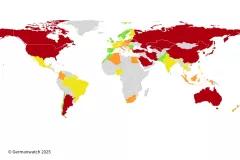The original version of this op-ed was published on Tagesspiegel Background (in German).
The new German coalition government emphasises the importance of strategic partnerships - but its actual plans tell a different story. Rather than fostering equal and mutually beneficial alliances, the focus lies squarely on Germany’s own interests, ranging from curbing migration at its source to securing access to raw materials. In doing so, Germany risks squandering both its credibility and its own long-term strategic advantages, as Lukas Kahlen and Ines Paiva from NewClimate Institute warn.
It is encouraging that the incoming German government is striving for a coherent foreign policy and seeks to establish long-term development partnerships. The rightly emphasised need for improved interministerial coordination is also beyond dispute – better alignment between foreign, economic, and development policy could significantly enhance Germany’s international presence. And yes, it is both legitimate and necessary for Germany to clearly communicate its own interests. Transparency towards partner countries builds trust and lays the foundation for stable, lasting cooperation.
A short-sighted approach falling short on an international climate strategy
Yet, the coalition agreement between the conservatives and the socialists lacks a clear strategy for international climate policy and global partnerships. Earlier negotiation drafts still emphasised international energy and climate policy as an ‘elementary component of German foreign policy’. This statement is now missing from the final agreement – along with a clear signal to Germany's international partners.
Climate is neither positioned as a priority within development policy nor integrated into efforts to strengthen Germany’s economic and security interests. This omission is a serious oversight, considering the impending economic transformation and the rapidly shifting geopolitical landscape.
Germany no longer finds itself in a traditional donor-recipient relationship with countries in the Global South. These partners now negotiate from a position of strength – boasting essential raw materials, vast renewable energy potential, growing consumer markets and young, skilled workforces. All of these are vital to Germany’s highly export-driven economy, which faces rising demand for energy imports and skilled migration. Failing to recognise this shift risks undermining the very partnerships Germany needs. And with them, the future of its economic competitiveness.
A global race for partnerships
Germany is in the midst of a global competition for strategic alliances. The transition to climate neutrality is inevitable and enshrined in the country’s constitution, driven not only by environmental necessity but also by economic logic. Those who fail to act today will forfeit influence and competitiveness tomorrow. While countries like China expand their global reach with vast infrastructure and investment packages, the new German coalition appears to be missing the opportunity to leverage international climate policy and partnerships as geopolitical tools.
Instead of prioritising joint transformation agendas, the coalition agreement places disproportionate emphasis on curbing the root causes of migration. Partner countries now have a choice. They are more likely to align with those who take their development perspectives seriously and offer compelling models for cooperation.
Framing access to raw materials as a key goal of German development cooperation is unlikely to win hearts. If Germany is to back its claim of being a global transformation partner, it must engage on equal footing and develop innovative, forward-looking partnership models.
The necessity of European trade partnerships
One major opportunity lies in an ambitious, member state-driven European Clean Industrial Deal – one that considers both domestic and partner country interests. Close coordination between Germany and the EU will be particularly vital in shaping the EU’s new Clean Trade and Investment Partnerships.
Acting as “Team Europe”, as the coalition agreement proposes, could significantly enhance the EU’s standing with countries in the Global South. Without close, coordinated cooperation with these nations, Germany and the EU will neither be able to achieve their climate goals nor remain economically competitive in the long run.
Integrating energy and climate diplomacy into foreign policy would mean building climate-neutral value chains, supporting investment in sustainable industries, and directly helping partner countries transform their economies in a future-proof direction.
Seizing the geopolitical realignment as an opportunity
The timing could hardly be more critical. The geopolitical landscape is shifting; traditional alliances are evolving, and the Global South is asserting its voice in global decision-making. Meanwhile, the retreat of the United States from several multilateral forums has created a vacuum – one that must either be filled actively or conceded to other players such as China and Russia. Germany and the EU must act now to cement their status as preferred partners to the Global South.
To do so, German foreign and development policy must adapt to today’s realities. That requires a strategic course that sees international climate and transformation policy not as peripheral, but as an integral part of trade, security, and development partnerships.
The proposed establishment of a "North-South Commission" could play a vital strategic role as a platform for dialogue – but only if backed by adequate funding. Rather than cutting these budgets, as announced in the coalition agreement, it is vital for EU member states to increase their official development assistance (ODA), particularly for climate action. This would signal reliability at a time when development funding is being slashed globally.
The need for strategic clarity
The new government must future-proof its foreign policy. This means more than improved coordination or clearer communication of national interests. It means creating competitive, attractive offers for international partners. Only those who position themselves as reliable partners in transformation will remain economically and geopolitically relevant.
Now is the moment to act decisively and embrace climate policy as a strategic instrument. Without a clear and forward-looking course, Germany risks losing direction in the global transformation journey.
Lukas Kahlen and Ines Paiva work at NewClimate Institute on climate diplomacy and partnerships.
The views expressed in this article are those of the authors and do not necessarily reflect the views or positions of NewClimate Institute.







